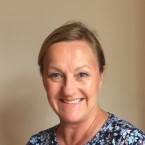Little did I realise that a 2-week mission as a volunteer nurse following the 2010 earthquake in Haiti would lead me to go on working there for nearly 3 years and establishing the first SCI unit and outpatient rehabilitation clinic in the capital of one of the poorest countries in the western hemisphere. I am incredibly proud of our achievements in Haiti where historically newly injured patients would be turned away from hospital as being too complex to treat. SCI is a complex condition with a high morbidity and mortality rate, especially in developing countries. Many of the patients in Haiti had large grade 4 pressure injuries, but even these are healable with conservative management. I am still in touch with some of the patients 14 years on. This surely is a testament to the capacity that has been built up for SCI health care in that country, and that’s what inspired my subsequent career.
After the 2015 Nepal earthquake, I worked as a SCI educator and volunteer co-ordinator at the spinal injury rehabilitation centre just outside Kathmandu – the only centre in the country – and where the number of new SCI patients went from 36 to over 200. Since then, a concerted programme of capacity building has enabled the Nepalese staff to implement SCI education programmes for health professionals, patients and carers all over the country.
For the past 10 years, I have been an active member of the International Spinal Cord Society Education & Sudden Onset Disaster Working Groups as well as the co-founder of the International Network of SCI Nurses. I have also been on World Health Organisation core working groups where we have come together to produce authoritative publications to enhance SCI health care worldwide.
Someone with a SCI has sustained a life-changing injury which affects multiple systems in the body. Patients stay on the rehabilitation ward for weeks, often months. This means that as nurses, we really get to know our patients and their loved ones, while providing them with specialised, individualised, holistic care as part of the interdisciplinary team.
Raising awareness about the impact that SCI nurses can make for this group has been a passion of mine for many years. I have had the opportunity to present at many conferences and contribute to publications, as well as providing education and training in countries around the world. They include India, Mongolia, Tanzania, Botswana, Ukraine, Sri Lanka, Mauritius, Madagascar, Myanmar, Jordan, Morocco, Malaysia, Indonesia and Bangladesh. In at least some of these countries, and elsewhere around the world, capacity building for health care is being sorely hampered by the havoc of war. Perhaps with that in mind, on top of ongoing concern that SCIs resulting from violence remain a major concern globally, the slogan for this year’s World SCI Day is ‘End Violence – Protect Spinal Cord’. And surely, we all have a part to play in trying to achieve that.
After the 2015 Nepal earthquake, I worked as a SCI educator and volunteer co-ordinator at the spinal injury rehabilitation centre just outside Kathmandu – the only centre in the country – and where the number of new SCI patients went from 36 to over 200. Since then, a concerted programme of capacity building has enabled the Nepalese staff to implement SCI education programmes for health professionals, patients and carers all over the country.
For the past 10 years, I have been an active member of the International Spinal Cord Society Education & Sudden Onset Disaster Working Groups as well as the co-founder of the International Network of SCI Nurses. I have also been on World Health Organisation core working groups where we have come together to produce authoritative publications to enhance SCI health care worldwide.
Someone with a SCI has sustained a life-changing injury which affects multiple systems in the body. Patients stay on the rehabilitation ward for weeks, often months. This means that as nurses, we really get to know our patients and their loved ones, while providing them with specialised, individualised, holistic care as part of the interdisciplinary team.
Raising awareness about the impact that SCI nurses can make for this group has been a passion of mine for many years. I have had the opportunity to present at many conferences and contribute to publications, as well as providing education and training in countries around the world. They include India, Mongolia, Tanzania, Botswana, Ukraine, Sri Lanka, Mauritius, Madagascar, Myanmar, Jordan, Morocco, Malaysia, Indonesia and Bangladesh. In at least some of these countries, and elsewhere around the world, capacity building for health care is being sorely hampered by the havoc of war. Perhaps with that in mind, on top of ongoing concern that SCIs resulting from violence remain a major concern globally, the slogan for this year’s World SCI Day is ‘End Violence – Protect Spinal Cord’. And surely, we all have a part to play in trying to achieve that.


 Share on LinkedIn
Share on LinkedIn




